Lorina Stephens's Blog, page 15
March 24, 2020
Free ebook by Michael Skeet
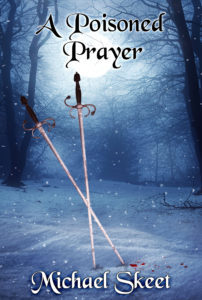 This week we’re featuring the first of Michael Skeet’s The French Intrigues series, A Poisoned Prayer in our weekly free ebook diversion, exclusively through Kobo.
This week we’re featuring the first of Michael Skeet’s The French Intrigues series, A Poisoned Prayer in our weekly free ebook diversion, exclusively through Kobo.
From March 24 through March 30 you can download this delicious romantic fantasy intrigue inspired by 17th Century Paris. This is excellent writing sure to sweep you away for eight to nine hours. If you need to convert the EPUB to another format, we encourage you to download the free Calibre app.
Happy reading!
March 17, 2020
From me to you
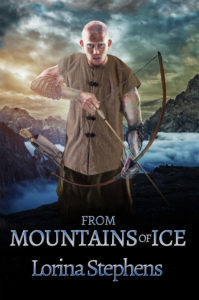 To help you get through quarantines and this COVID19 pandemic, I’m offering a free ebook a week exclusively through Kobo.
To help you get through quarantines and this COVID19 pandemic, I’m offering a free ebook a week exclusively through Kobo.
From March 18 through 24 you can download From Mountains of Ice for free through Kobo. This is a sweeping tale of a mad prince, a reluctant hero, and the dead who guide him. This is a relative quick read, about six to seven hours. If you prefer audio, you can download that through Amazon, Audible or iTunes, but that’s not free.
If you like the ebook, I encourage you to leave a review on Kobo, Facebook, LibraryThing or Goodreads.
And if you require a different format, please download the free app Calibre. All my books are DRM free, which makes converting them to your preferred format so much easier.
For your social distancing hours
 Many of us are working from home, or are confined to home because of Covid19 quarantine or shutdowns. Some of us are seeking entertainment now that our social calendars have gone poof.
Many of us are working from home, or are confined to home because of Covid19 quarantine or shutdowns. Some of us are seeking entertainment now that our social calendars have gone poof.
So, as Five Rivers’ way of helping to fill that time, keep you engaged and entertained, we’re offering a free ebook a week through Kobo. Why Kobo? Because of all the digital platforms they have the least restrictive and demanding platform of any distributor, most especially Amazon, with a global reach. And if you are reading on a Kindle or other device, and require a format different than an EPUB, you can easily download the free Calibre app and convert to MOBI, PDF, or whatever else you require. All our ebooks are DRM free, so you won’t have a problem.
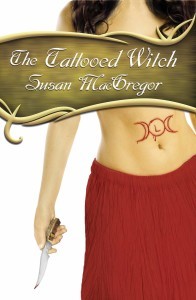
For the First Week
This week we’re showcasing the first in the Tattooed Witch trilogy by Susan MacGregor. It’s about a seven to eight hour read, full of wonderful historical inspiration from the Spanish Inquisition, the Romani, a bit of magic, some romance, intrigue, dastardly villains and reluctant heroes. You can link to the Kobo page here.
The sale continues from today until March 23.
And if you enjoy it, please leave a review on Facebook, Kobo, LibraryThing, or Goodreads.
February 28, 2020
CLUBHOUSE reviews Derryl Murphy’s Wasps at the Speed of Sound
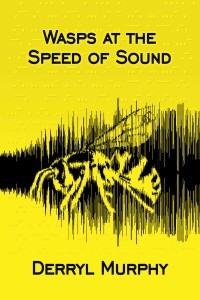 Lost Jenny – All stories by Derryl Murphy
Lost Jenny – All stories by Derryl Murphy
Premise:
A somewhat uncouth young chappie is enjoying watching the end of the world from an apartment tower roof, occasionally taking time off to trash some of the apartments just for fun. Seems aliens are dismantling the moon and smashing bits of continents (starting with California oddly enough) as a warning they’ll get tough unless Earth hands over the female alien they’re looking for. Unfortunately nobody knows who or what they’re talking about.
Turns out our young thug already knows the alien, slightly, and on running into her again decides to help her. This will probably make the other aliens really mad. Things can only get worse.
Review:
You don’t really think the end of the world will witness humanity either panicking or stoically confronting their fate with stiff upper lips do you? Fact is quite a few people will be rather content, even happy, as all the people who’ve been picking on them will be about to get theirs. You’d be amazed how many people would enjoy seeing the world they’ve learned to hate get smashed. They won’t mind dying, as long as everyone else dies with them. In truth the protagonist seems to be rather invigorated by the impending collective fate. Appears to regard it as a great equalizer, which, of course, is exactly what death is.
Mind you, it is possible to face death with little more than idle curiosity. Back around the time of the Cuban Missile Crisis I asked my dad, a serving RCAF officer, what he would do if nuclear war broke out. “Well,” he replied, “if I’m home I’ll send you and your brother and your mom down into the basement, and then I’ll go up on the roof and watch. Probably have time for a couple of shots of whiskey and at least one cigarette. Should be quite a show.”
And the Aliens may not even care. In this story they’re focused on getting the “woman” back. Could be the destruction of the Earth is nothing more than a quick and easy solution to their problem, the consequences of which may mean nothing to them. Greater intelligence may equate to superduper rationalization powers. Then again, maybe they’re too alien for us to understand their motives. These are among the reasons I hope we NEVER contact an advanced alien civilization. Nothing good can come of it. And if we are more advanced than they are, I pity the poor aliens.
Point is the reaction of our “hero” to events is perfectly credible. Many people are liable to behave in exactly the same way during the end of the world. They will be quick to take advantage even though they are doomed, maybe because they are doomed. A psychologically astute story.
Island of the Moon
Premise:
In the near future a TV journalist is driving through the Martian-style desert of Madagascar to reach one of the few remaining stands of trees in order to broadcast live the death of the last remaining Golden Lemur, a sickly beast monitored round the clock by biologists. So many animals have recently become extinct it has become a topic of some interest, and it is hoped actually capturing an extinction live on camera will be good for ratings.
He is accompanied by one of three aliens who landed on Earth a decade earlier and have been wandering about ever since, studying humanity without explaining why. This one is keen on witnessing the extinction event. When it occurs the alien becomes, for the first time, quite talkative. Unfortunately.
Review:
This story captures the sadness and depressing finality of extinction quite well. It is a warning of sorts, a lesson that is timely and pointed, but also futile because it is preaching to the converted. The people who actually hold the fate of the world in their hands won’t be reading it. They’re having far too much fun manipulating humanity like so much wet cement to be shaped into a monument to their ego and ambition. We haven’t got a chance, frankly.
But as one famous biologist (whose name I can’t remember) once pointed out, the last member of a species doesn’t know it is the last. It only knows that it is alone. The real torment and angst is in the minds of human observers. Question is: who or what will mourn our passing? And don’t say the cockroaches. They don’t care. Really. They don’t. The little buggers.
Those Graves of Memory
Premise:
Bryce is a human being, and a member of the Stewardship and Extinction Committee founded seven billion years earlier. Bryce is a charter member. There are seven others. Together they constitute what’s left of the human race. His drone (which preserves most of his memories, more than his brain is capable of handling) thinks it has found Earth, the original home world of mankind. It wasn’t easy. The last sentinel guarding it had gone insane and hidden it hundreds of millions of years ago. Being as old as it is, the Earth is a ball of rock as featureless as a billiard ball. Bruce amuses himself watching his drone build a facsimile of his birth neighbourhood out of solid rock while he waits for the rest of the committee to arrive. Sad, pathetic Earth. Once the others are present they’ll decide what to do with the poor old thing.
Review:
A Stapledonesque story, apart from some ‘fresh’ memories installed by the drone which encapsulate a particular moment in time. Seems the physical solution to being immortal prevents poignant memories brought on by unexpected reminders, unless your drone grants you access to its backup storage of your memories. But, in order to do that, you have to swap out recent “new” memories in order to make room for new “old” memories. Turns out that one’s flesh cauliflower isn’t as holistic and infinite in capacity as most SF writers assume, at least not over billions of years. This is an exceedingly well thought-out exploration of the limitations of an immortal mind. However, the fundamental conundrum remains; the eight surviving humans are in better shape than Old Earth, but for how much longer? A sad and poignant glimpse of our far distant future.
Father Time
Premise:
The unnamed protagonist has a problem. His father is dying, and keeping bedside vigil is more than usually difficult because his father keeps dropping by to check on how things are going. His father being a time traveler you see. The main character has long hated his father for abandoning him as a child, but it’s all the more frustrating because his father periodically and unexpectedly pops in to apologize, and then he’s off again. Now his father is offering him family time, the opportunity to join him in his travels. May be a bit late for that. Or too early?
Review:
This story is actually quite good but I find the ending confusing. I think I’ve figured out the complexity of it all but I’m not sure. Did I mention I get easily confused if things aren’t strictly linear? (Things in plots, things in life, things in mind, etc.) Probably part of the aging process, though I assume an exaggeration of something that has always been a part of me. I can be pretty sharp, but only when I know what I’m talking about. The rest of the time people confuse my vague, meandering focus with an equivalent state of mind. Come to think of it, they’re right. But at least I’m sharp enough to understand that. What’s the solution? Expand my mind? Further my education? Seek out new experiences? Nah. Too lazy. I’ll just stick with the tried and true. Now you know why the human race doesn’t progress as fast as you think it should. People like me hold it back. Still, that implies I’m a typical “everyman.” Consequently my critiques may have some value. Maybe.
Wait a minute. I believe I’m obligated to make a point. Ah, yes, the story is cleverly constructed and most intriguing, if a bit beyond me.
Day’s Hunt
Premise:
Davies is a harpooner serving aboard the whaling vessel Ew York Tim sometime in the far future when the oceans are crowded with the garbage of centuries and the only technology to be had depends on whatever you dredge up from the bottom of the ocean. Residual radiation is a bad thing, what with everyone developing more and more tumors as they age, but at least the mutant whales are tasty, if difficult to catch. Besides, whale meat makes a refreshing change from the centuries-old bits of food floating amid the garbage.
Review:
Ever resourceful, mankind endures on its own garbage, especially since the garbage has developed a renewable ecology of its own. Darn good thing, too, considering the natural ecology of old has long since disappeared. Derryl has a lot of fun running with this decidedly odd retelling of Moby Dick. More of a vignette than a story; the scene is the thing. A warning tale of sorts, I suppose, but mostly just a bit of fun.
Wasps at the Speed of Sound
Premise:
If a wasp flies at you it’ll go right through you. In fact, all insects have developed exaggerated natural powers. Fireflies can hit sub-light speeds. Ant lions can strip you to the bone in a flash. So Abe wears home-made armour when he sneaks up on the nests with his home-made flame thrower. Even his country home is home-made, having been converted into a somewhat bug proof shelter. His buddy Mike helps him kill bugs. Then Ryan shows up, an electronics salesman who claims the bugs communicate with him in Morse code. He suspects the bugs are up to something, following a master plan, and if the few humans left alive can only figure out what it is they might be able to win the war. Trouble is, not much time left. The bugs are on the verge of victory.
Review:
This story put me in mind of this or that B movie, including the one where bugs spell out messages with their bodies, but nevertheless Derryl’s tale is an original take on the theme of bugs gone mad, or nature’s revenge if you will. How bugdom has developed super powers (including intelligence) is explained, but I was a little unclear for a while why they make so limited tactical use of their newfound abilities. Turns out there is a reason. This be a fascinating story about the real aliens in our midst. And yet … and yet … maybe … not too alien?
What Goes Around
Premise:
Henry Angel produced and starred in a TV pilot for a show called Space Cops back in the 1950s. The network didn’t like it and it never aired. He soldiered on with bit parts in B movies but, oppressed by failure, wound up a middle-aged alcoholic who sat around on his couch watching TV and waiting to die. Then a “ghost” from the future began visiting him, a future oddly familiar, and one the “ghost” wants him to visit.
Review:
In a sense this is old-fashioned SF about an old-fashioned SF TV show and its unintended consequences centuries later. That future civilization is derelict is also old-fashioned, but the fact that the dress, habits, and behaviour of our descendants are oddly askew and different is original and entertaining. Granted, the central plot element is a standard science fiction motif, one so wholly absorbed into a recent movie franchise that it might be impossible for younger readers to recognise this story is actually a fresh take on the concept written before it became the mother of all clichés. I like it. I am very comfortable with it’s old-fashioned approach, pleased that it addresses the future of humanity on a grand scale, and satisfied with its low-key, somewhat melancholy ending that reduces the whole conundrum down to Henry’s personal fate. Old fashioned, yes, but delightfully and playfully old-fashioned.
Note: I used “old-fashioned” six times in a single paragraph. Shows how “old-fashioned” I am!
Blue Train
Premise:
In a world gone largely dry Andy is out prospecting for water in Southern Alberta with the aid of his snarky A.I. Quad. Miraculously, they find a spot where the long hidden water table has finally risen to the surface. Trouble is, so has a California “snifter” robot, and because of that, a mobile sentient pipeline is approaching to steal the water and pipe it down south. Andy is very upset. It can only mean the Province has ceded a portion of Southern Alberta to California and he can’t legally intervene. Not only will he not benefit from staking a claim on this vital resource, neither will his fellow Albertans. What to do?
Review:
In a world where the CEO of Nestle has stated access to water is not a human right, and many a small town has discovered its local water source purchased and being drained by Nestle to sell back to them as bottled water, this story is frighteningly prescient. The tech depicted is still far in the future, but the social conundrum, governments using access to water to control the loyalty of citizens, is only a few years distant at most. Some say it is beginning to happen all ready. Which makes it all the more important to consider what Andy choses to do as a role model that may be what is necessary to avoid a future dictated by a government with an absolute monopoly on the single most important resource of all. This story more relevant now than when it was written.
The Abbey Engine
Premise:
Marty and Stan are visiting Hoover Dam. Security is everywhere, determined to prevent agents of the Federal government from destroying the dam which, after all, is holding back a toxic lake seething with industrial poisons. But Marty and Stan aren’t Feds. They’re just good old-fashioned eco-terrorists armed with a secret weapon.
Review:
This is a remarkable vision of a potential use for an advanced technology normally described as incredibly beneficial and absolutely necessary for the future wellbeing of humanity. Turns out, maybe not. Might be an idea to hold up on some of those government research grants till people have thought things through. Once unleashed, no putting it back where it belongs. The author adds a playful touch which strains credulity, though not if you consider it a manifestation of an extremely advanced version of the tech. The virtue of an imaginative story like this is it makes contemporary technology seem positively benign in comparison.
The History of Photography
Premise:
Laird is one of the last film photographers, specializing in large format nature photography, very much as Ansel Adams used to do. Only now the air is everywhere polluted, and even the insects tend to be mutants of one kind or another. Nature barely functions, and only man and his technology can be said to flourish. Laird is getting old. This may be his last expedition.
Review:
The story does in fact offer a description of the history of technology, or at least the beginning of the concept. It also offers in fine detail an explanation of how photography actually works, or rather the multiple ways it can work. Where the science fiction aspect enters in has to do with the author’s speculative extrapolation of digital and computer technology trends and the consequent inevitable fate of the art of photography and, indeed, humanity itself. People are expecting Skynet. This story suggests sufficiently advanced technology will accomplish something infinitely more subtle yet equally as dangerous to the human condition and what it means to be human. A thoughtful and thought-provoking tale, and just a tad depressing. A bang-on description of what photography actually is, though. Learned quite a bit.
Summer’s Humans
Premise:
Cam and Laura are settlers on a primitive planet. They thought the colony would be a fine place to bring up their two young boys and three-year-old daughter Jenny. The Makaepie, the indigenous natives, are of course profoundly grateful to be employed by the humans and be lifted culturally above their miserable subsistence-level non-technological mud hut culture. All the more surprising, then, that the Makaepie would launch a planet-wide revolt utilizing seized modern weapons even to the extent of shooting down fleeing spacecraft. Why, the Makaepie turned out to be as brutal and ruthless as their civilized masters. Impossible! And yet …
Fortunately their trusted servant “Summer” leads them to his village and offers the family sanctuary. But for how long? And for what reason? It can hardly be loyalty, in light of what is happening elsewhere. Laura finds it very hard to hide her fears from her family.
Review:
This is an original story written for this anthology. For me its subject is a nostalgic throwback to my childhood when innumerable African nations fought (successfully) to overthrow their colonial masters. One aspect common to many of the them was the shock and disbelief among many white settlers that their good and loyal blacks would turn on them. They just couldn’t fathom it. The revolts and revolutions ran completely counter to their cherished vision of themselves as stern but just benefactors. Some colonies gave in quickly, others pursued their own white-directed independent status for decades, but in the end every single one of them lost and became black-ruled. They probably should have seen it coming, but they didn’t want to. Today, Africa as a whole is far from settled and secure, but most conflicts these days are internal political shenanigans rather than racially motivated outbursts, so there is hope that all peoples (and Africa is very diverse) will learn to live together.
This story implies human colonists might make the same sort of mistake dealing with allegedly lesser alien cultures. It does seem to be a habit of our species, in dealing with internal factions, as history proves time and time again. Something to grow out of, or perhaps to adapt away from. On a small scale, this story hints at a potential for coping with our inbuilt faults. Perhaps we are not as hopeless as we think. A cheerful thought, what?
CONCLUSION:
Every story in this anthology is highly imaginative and often quite subtle. Derryl Murphy has put a great deal of thought into working out all sorts of unexpected implications and consequences of near future trends and technologies. If you ask me, science fiction at its best. Really good stuff.
February 17, 2020
Attention Canadian book clubs!
There is what looks like a useful and interesting new portal which connects Canadian authors with book clubs across Canada: The Authors Book Club.
Founded by writers David Albertyn and Ann Y.J. Choi, The Authors Book Club aims, in its own words, “to create an online community for authors and readers and to promote engagement between them”. The Club also hopes “to be a resource for book clubs in Canada and to connect them with authors”.
Worthy goals and a great way to promote Canadian authors while exposing book clubs to new writing.
Authors can put together a profile for the site consisting of a mini-bio, a description of their latest works, contact information and a note about where they’re located (and willing to travel to).
Five Rivers’ author, Nate Hendley, is part of the authors available through the service.
February 10, 2020
Thoughts on submissions
I used to think of myself as a dream-maker, someone who would champion unknown Canadian authors and give them voice. In some ways I still hold that belief, live by it. But I’ve also come to understand an inherent laziness in so many fellow writers, indeed creators. “Laziness?” you cry. Yes. Laziness.
What do I mean by that? How could I dare be so cruel? (insert shrug here) It’s not with a cavalier attitude or intent to eviscerate that I write that. What has nurtured that belief is experience. Allow me to illustrate.
Basic language skills
There seems to be an inherent assumption that an editor is going to fix all your spelling and grammar errors. While that is essentially true, there is also the truth that if you want me to read your manuscript, you best put your best work forward. Think of this as a date. Are you going to show up in dirty clothes, unwashed, reeking of your last workout? Is that moss in your hair? A boogie hanging from your nose? What? You’d like a hug? Um, no, because I think I saw something crawling up your sleeve, and I prefer eau du soap, not eau du pong.
That’s how I feel when I receive a manuscript with a consistency of not only incorrect spelling, or spelling outside of our submission guidelines (Canadian), but an essential and willful disregard for things like the proper capitalization of proper nouns versus objective nouns, and knowing the difference. Of an understanding of typesetting conventions which employ a single space after a sentence stop, not a double. (If you don’t know why, look it up.) Of an understanding of when and how to use quotation marks, what type of quotation marks. How and when to use, and not to use, ellipses, parentheses, em-dashes. How to construct a paragraph in which dialogue and action both occur.
That opening sentence
Throughout the years there has been considerable discussion regarding a good opening line or paragraph.
 Take a look at the opening paragraph of Michael Crummey’s stunning, award-winning novel, Sweetland:
Take a look at the opening paragraph of Michael Crummey’s stunning, award-winning novel, Sweetland:
He heard them before he saw them. Voices in the fog, so indistinct he thought they might be imaginary. An auditory hallucination, the mind trying to compensate for a sensory lack. The way a solitary man will start talking to furniture, left alone long enough.
Right from the outset we know the main protagonist is male, living in a place which very likely receives a considerable amount of fog given the character’s seeming familiarity with the properties of fog. There is also foreshadowing in the last line, of a man becoming solitary, of him perhaps losing his grasp of reality, of loneliness brought about by long isolation. And there’s an inference he is familiar with being a solitary man, because he has knowledge of what might happen.
Wow. That’s a lot packed into one short paragraph.
But there’s more. We know there are people out there, which raises the question of whether he’s going to meet these people, if they’re going to come to him, or he to them. And by doing this Crummy sets up tension.
Yet I have seen, over the years, a plethora of manuscripts come across my desk which would have taken those basic elements and begun thus:
It was foggy, dense and grey. Moses could hear voices out there, likely islanders come to browbeat him into accepting the government’s offer to get the hell off the island.
 You want fantasy, not CanLit? Take a look at the opening paragraph from D.G. Valdron’s The Mermaid’s Tale:
You want fantasy, not CanLit? Take a look at the opening paragraph from D.G. Valdron’s The Mermaid’s Tale:
It was a rough assembly of lumber, called the Mermaids’ Dock, that reached into the shallow waters near the Selk domain. The water wasn’t deep enough for most large craft this late in the season, so the dock had fallen into disuse. I could hear the rotting timbers creak under my feet as I went out to the end and sat down.
We know right away it’s likely autumn because it’s late in the season. It is inferred this novel is likely going to deal with decay, given the mood and description of rotting timber and ill-maintained infrastructure. And we know the speaker is there on the dock for more than a brief moment, because they’ve sat down, and it is also inferred the character is accustomed to decay because they show no trepidation about both walking on such a structure, and sitting.
Again, that’s a lot.
Yet another writer might have chosen to pen something thus:
I walked out across the rotting dock and sat down, looking out over the shallow waters near the Selk domain.
Or I’ll give you a reverse example I used during my tenure as writer-in-residence at the Neustadt Public Library this past summer.
It was a dark and stormy night.
Which becomes:
She stood there shivering, rain sheeting down her face, wondering not for the first time what she was doing out on such a night, in such a storm, with the wind howling like her own thoughts.
Now the weather is part of the character. There’s tension because she’s shivering. Is it from cold? Is it from fear? Perhaps fear because we are then given the clue she’s distressed as indicated by the phrase: howling like her own thoughts.
So, of those opening paragraphs, which manuscript do you think I’d continue to read?
Don’t expect your publisher to teach you to write
The above is just one example of many tools at a writer’s disposal, and tools you should have in your kit. Don’t expect your publisher to teach you these things. You should write and write and revise and revise until your work is taut and polished and as close to perfect as you can make it.
I’m going to lift a quote from Michael R. Fletcher here, because it’s an absolutely perfect illustration about the mindset every writer needs to employ when revising that first draft:
Writer me: And then he heard the thing, WITH HIS EARS!!!
Editor me: Fucking hell you are useless.
And read. Lots of material. Research material. Authors you admire. Authors you don’t. Figure out what the research means, why you admire an author, why you don’t admire another. Employ critical thinking, and then employ that to your writing. Second guess every damned line you write. Ask yourself: is there a better way to write that scene, illustrate that moment, convey the inner workings of that character, that information? Have I sustained tension throughout that sentence, that passage, that chapter, that novel? Or have I allowed the tension to arrest because I stopped for an information dump, or broken point of view, or, or, or. Be your worst nightmare. Eviscerate. Deconstruct. And then reconstruct.
Or, as Margaret Atwood is wont to say: the waste basket is your friend.
But most of all, do this for yourself. Don’t be lazy and expect a publisher or editor to fix that for you. You can only be brilliant within yourself. No one can make you brilliant. Or, if they do, then the work is no longer yours, but a collaborative effort.
February 3, 2020
Twisted Podcast
 Nate Hendley
Nate HendleyNate Hendley recently was interviewed by Twisted Podcast regarding his biography of notorious gangster, Al Capone.
Interview below.
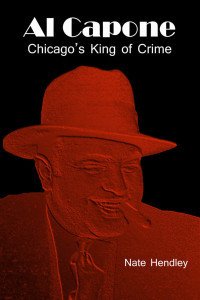
January 29, 2020
A sheaf of overdue reviews
During recovery from two knee replacements, I read a great deal, but didn’t have the wherewithal to write reviews. So, this post will cover several novels I read during 2019.
The Stolen Child, by Lisa Carey
 The Stolen Child by Lisa Carey
The Stolen Child by Lisa Carey
My rating: 3 of 5 stars
A middling story which attempts to delve into mysticism and ends up being yet another escapist tale drawing upon Celtic lore and unspoken agendas.
This was one of my many reads of 2019 during knee replacement recovery. While it was escapist and required nothing from me other than the ability to read, the story remains not particularly memorable, the characters equally lacklustre, and the writing without that poignant resonance.
Perfect for recovery, the beach, or a winter’s read. But if you’re looking for something engaging, this is not it.
Sweetland, by Michael Crummey
 Sweetland by Michael Crummey
Sweetland by Michael Crummey
My rating: 5 of 5 stars
Sweetland, by Michael Crummey, was one of my last reads of 2019, and my introduction to Michael Crummy. And what an introduction. Sweetland will remain among my favourite novels of all time, and Crummey in my top five authors.
This is a novel which has it all: scintillating writing with believable, fascinating and flawed characters, a deep understanding of the culture and milieu, a plot which is relentless, alternating between tragically hilarious and heartbreaking in its futility. There was one point, during a sleepless night, I was reading in bed and wept inconsolably, inadvertently woke my husband with grief, and could only mutter to his query after my welfare: “It’s such a good story.”
Set on a eponymously named island in Newfoundland, Crummey writes a tragic story about family, secrets, an unwillingness to accept change, and an inability to face demons. It is classic literature in scope, a story which should be read by every Canadian.
The Innocents, by Michael Crummey
 The Innocents by Michael Crummey
The Innocents by Michael Crummey
My rating: 5 of 5 stars
Having read Sweetland, I had to find more of Michael Crummey’s work, and delved almost immediately into The Innocents. Crummey’s ability as a premiere writer remains inviolate in this devastating, brutally honest, historical tale of an orphaned brother and sister who eke out an existence as indentured fishers on one of Newfoundland’s inhospitable islands.
There are so many resonances with so much of classic literature in this tale, and yet Crummey makes this story completely his own. He deals deftly with the concepts of morality and innocence, of brutality and necessity, all done so deftly the themes weave through the story like the air we breathe. I was minded over and over again of an almost Hardian disposition to Crummey’s work, in that the land and environment were equal characters, taking on a silent and ominous presence throughout the narrative.
And I was also minded of the Christian mythos surrounding the Garden of Eden and the notion of innocence.
This is not only very great literature, but somehow also very great escapist reading. You will find yourself drawn in, unable to stop thinking about this place, these characters, this tale. Highly recommended.
And the Mountains Echoed, by Khaled Hosseini
 And the Mountains Echoed by Khaled Hosseini
And the Mountains Echoed by Khaled Hosseini
My rating: 3 of 5 stars
I came to And the Mountains Echoed expecting an historic tale which would sweep me away, given the literary acclaim Khaled Hosseini received for this epic novel set in Afghanistan.
There is, in fact, much to praise in the novel. The writing is gorgeous, the characters well-drawn. But the plot and the way in which Hosseini chose to tell his tale fell short, at least for this reader. Hosseini chose to tell his story employing a literary device of recounting one story through several perspectives, and it is perhaps this device which diminished the impact of his work, at least for me, having never been a fan of this style.
What I was left which was an unresolved story, which left more questions than answers. But perhaps this was in fact a clever device on Hosseini’s part, because the issue of Afghanistan itself remains an unresolved nation, spilling from question to difficulty to question again.
At its kernel, the story revolves around the separation of a brother and sister, brought about by staggering poverty, and their lifelong quest to find each other, and in the end, submit to the necessity of the metamorphosis of their lives.
Recommended.
Tell, by Frances itani
 Tell by Frances Itani
Tell by Frances Itani
My rating: 2 of 5 stars
I couldn’t help but feel Frances Itani started out to write one story, changed her mind, and wrote something completely different, clumsily fusing the two manuscripts into one.
We are introduced to this narrative through a returned soldier who suffers so severely from PTSD and his war injuries that he cannot face people, and so becomes a haunt of the night, rarely speaking, never interacting, and it is this story which is compelling, epic in scope.
However, what Itani chose to tell is the story of the grieving wife who escapes into an extra-marital affair. It is this story which takes the fore, overshadowing what could have been the more interesting and compelling study. Instead of examining the complexities of relationships and the relentless rooms of a veteran’s psychological prison, Itani tells an illicit romance. And not particularly well. The actions and scenes and characters end up predictable, with the only character of interest left without a voice.
A disappointing story overall.
The Testaments, by Margaret Atwood
 The Testaments by Margaret Atwood
The Testaments by Margaret Atwood
My rating: 5 of 5 stars
It would seem Margaret Atwood’s summation of The Handmaid’s Tale has solicited, as much of her work, strong reaction. For myself, it was a fascinating and plausible development of background for the nation of Gilead, its founders and visionaries, despotic and reactionary as they are, as well as those who sought to destroy the regime from within.
Without giving away too much of the plot, Atwood creates a twist from a character least expected to play the counter-revolutionary. It is a brilliant ploy, in a novel which is relentless in its barren landscape both of the mind and environment, matched by a writing style which is equally spare and devoid of embellishment save for the razor edge of wit and insight. This is a raw story, told in a raw fashion, with raw language.
Like Atwood or not, there is no gainsaying she is a visionary author, with towering ability, and a canon of work which will endure. Recommended reading.
Then she was Gone, by Lisa Jewell
 Then She Was Gone by Lisa Jewell
Then She Was Gone by Lisa Jewell
My rating: 2 of 5 stars
Another of the many novels I read during my recovery, I’m afraid Then She was Gone, by Lisa Jewell ended up being one of those experiences I wished to end, quickly, without pain, but alas that was not to be. The story went on and painfully on, completely lacking in credibility, and so utterly predictable and stereotyped as to drive me to distraction.
Jewell’s story deals with a mentally ill woman who kidnaps a child and confines her in a cellar, artificially inseminates the girl when she becomes nubile, all with the hope of regaining the attentions of a lover from whom she’s estranged.
The science, the logic, all of it screams of a lack of research and understanding of her subject matter. What the reader ends up with is pulp fiction, utterly forgettable and a complete waste of time.
If you like this sort of thriller, knock yourself out. Myself: I’d rather have teeth extracted.
And that’s it for now
I have another five or six novels I need to review, all part of my recovery reading. Hope to have those done in the next week or so. In the meantime, I’m spending my reading time this winter by returning to some of my old favourite escapist novels, something familiar and absorbing. The first is C.J. Cherryh’s The Chronicles of Morgaine. This was my fourth or fifth reading of the omnibus, and now, close to 50 years later, the novels still stand up, populated by believable characters, great tension, phenomenal world-building. And now I’m reading for the second time N.K. Jemisin’s The Inheritance Trilogy, and loving every word, every scene. Such great fantasy writing.
Whatever you’re reading, I hope you’re enjoying the journey. You might try picking up one of my own novels. I think you might enjoy the time we spend together.
January 22, 2020
Review: Educated, by Tara Westover
 Educated by Tara Westover
Educated by Tara Westover
My rating: 1 of 5 stars
There isn’t a lot I could write to recommend this book to anyone, simply because it isn’t so much an autobiography as a fantasy fiction. Allegedly–and I do use the term advisedly, because many of Westover’s assertions lack any corroborating evidence, beyond her assertion–she was raised by fringe, likely mentally unstable parents who pursued a survivalist, conspiracy-theory lifestyle in Idaho.
Where do I begin? Perhaps with the caricature of the father. While tyrants and fathers and sheer crazy stupidity aren’t mutually exclusive, I’m afraid the combination in Westover’s presentation is a bit over the top. There are more than a few moments when her father suffers serious injury in his wrecking yard, and yet somehow miraculously survives without debilitating impediment, all through through the grace of hack home remedies not seen in employment since the Dark Ages, or perhaps anti-vaxxers and followers of Gwyneth Paltrow’s Goop snake oil. Which makes me wonder if in fact Westover’s mother wasn’t a supplier of witch-doctor remedies to Paltrow.
Then there’s Westover’s assertion she and her six siblings were home-schooled by their mother, not much beyond a rudimentary ability to read and write. Not that the education (or lack thereof) wasn’t possible, but that with this barely adequate education Westover somehow manages to not only escape the family cult, but achieve a stellar university education at Brigham Young, which institution is a known Church of Jesus Christ of Latter-day Saints university. While her education at is in fact a matter of record, how she achieved that given her background and financial distress remains questionable. Sure, there were grants, but as others have questioned, grants only take you so far.
And there is so much more which left me growling and researching to verify her allegations. I could go on. But what’s the point?
Yet this autobiography received considerable literary and critical acclaim, having achieved the LA Times Book Prize, PEN America’s Jean Stein Book Award, and two awards from the National Book Critics Circle Award. And that doesn’t encompass the endorsement and praise received from the likes of President Barak Obama and others.
Did no one question Westover’s radical claims? Did no one even have the basic understanding of some of the basic physics and science behind some of what she presented? Not one question from these luminaries? Just acceptance that because Westover wrote these things, and spoke with confidence, that all of this remarkable story is credible and true?
Perhaps I have grown cynical with age. But last I checked my ears weren’t wet, and if I’m going to invest time in a reading journey with an author, that author best be sure their facts are straight.
Read Educated or not as you choose. Just be aware you’re never going to get those hours back.
January 20, 2020
Tower in the Crooked Wood coming in audiobook
 It goes without saying I believe in the books we publish. That’s why when Paula Johanson offered us her wonderful YA fantasy, Tower in the Crooked Wood, I was so excited to bring to publication this West Coast First Nations influenced story. That was back in 2015.
It goes without saying I believe in the books we publish. That’s why when Paula Johanson offered us her wonderful YA fantasy, Tower in the Crooked Wood, I was so excited to bring to publication this West Coast First Nations influenced story. That was back in 2015.
Five years later, Tower in the Crooked Wood is still available in ebook. In December this year it’s also going to be available in audiobook. Canadian actor, artist, graphic designer and renaissance man, , has undertaken to narrate and produce this wonderful tale.
[image error]Michael Janetakes
Michael Janetakes has been an artist since childhood. He paints and scripts in many medium. He has been involved in the media and public relations arena for over 30 years, including identity branding, museum exhibits, sculpture, desktop publishing, wholesale markets, and advertising campaigns including small town promotions. He is passionate about performing in film (a member of ACTRA) and theatre, and song (ran a chamber choir for a few years.) He has served in many local charities and community groups. In 2008 he moved to Minden, Ontario, where he hosted a show on CANOE FM,and ran a resort. He now focuses on fine art, and acting in film and theatre.
Tower in the Crooked Wood audiobook will be available through Audible, Amazon, and iTunes. Keep watching our blog for updates.



